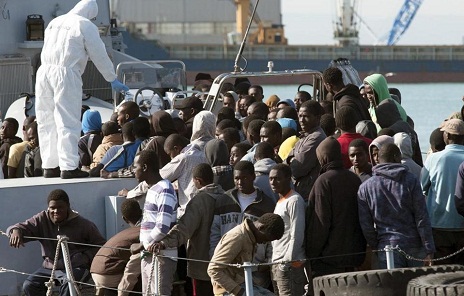Leaders of EU nations gathered in Brussels on Thursday for an emergency meeting on the issue, with the hard-pressed southern members — Italy, Greece, and Spain — demanding more money and more action from their richer partners to the north, including Germany.
The latest draft agreement under discussion also calls for the union to create a resettlement program for migrants, with 5,000 places available. But with migrants arriving at a rate of hundreds and sometimes thousands a week, a program of that size probably would soon be swamped.
UN agencies and the International Organization for Migration together have called on the Europeans to show leadership in responding to “a tragedy of epic proportions.” Amnesty International said before the meeting that the proposals being considered were a “pitifully inadequate and shameful response.”
At the same time, many of the European leaders must contend with growing anti-immigration political pressure at home, much of it from far-right parties such as the National Front in France, Jobbik in Hungary, and the UK Independence Party in Britain.
“The EU hasn’t had a coherent immigration policy since forever, and the situation is getting worse since the Arab Spring,” said Camino Mortera-Martinez, a research fellow at the Center for European Reform in London. “Now, there has been a wake-up call. But I am skeptical that things will change much. Europeans are less concerned about people who are not European.”
It is not clear how effectively the measures under discussion in Brussels would deter the thousands of people fleeing war and poverty in Africa and the Middle East from trying to reach European soil however they could. They would do little to address the lawlessness in much of Libya, the primary departure point for smugglers’ boats. And some critics said the proposals would not give authorities along Europe’s southern tier the means or the authority they need to intercept and turn back migrant vessels early in their voyages.
The 28-member bloc has had a hard time forging a common policy. Southern nations like Italy, Greece, and Malta, where streams of African migrants arrive by boat, have called for aggressive collective action. Britain, in the midst of an election campaign featuring heated debate on immigration issues, has been reluctant to devote more resources. On Thursday, Britain said it was offering a Royal Navy warship, three helicopters, and two border control vessels to help with search and rescue missions, but would not take in more refugees.
Germany, which received than 200,000 asylum seekers last year — almost one-third of the union’s total — wants the burden of housing and aiding the refugees to be shared more evenly. Some Central and Eastern European nations, which saw little immigration in Communist times, have been slow to adapt to the demands of European integration.
The union is now spending about $3.2 million a month on its border protection and sea rescue operation, known as Triton. But the scale of the problem is such that even doubling that figure, as the leaders pledged to do, might be inadequate, experts said. And some argued that expanding the program would encourage people to attempt even more perilous journeys to Europe.
The International Organization for Migration estimates that 1,727 migrants have died in the Mediterranean Sea so far this year.
Mortera-Martinez, of the Center for European Reform, said that ad hoc measures were unlikely to solve the migration problem, and that a robust overhaul was needed, including changing the rule that migrants must apply for asylum in the countries where they first arrive in Europe. She said that put an unfair burden on the front-line southern nations.
She dismissed the argument that expanded rescue operations would encourage illegal immigration, saying that people in desperate circumstances would seek refuge in Europe in any case.
Experts said the European Union’s creaking institutions are ill suited to rapid response, and it can take years to change immigration policies. “EU member states do not want to give up control over decision-making on immigration,” said Thomas Huddleston, program director at the Migration Policy Group in Brussels. “And now, suddenly, the EU has to act at light speed.”
Prosecutors in Sicily revealed details about the boat that capsized last weekend, based on interviews with 28 survivors. They said that smugglers had kept as many as 1,200 migrants under armed guard in a farm near Tripoli, Libya, for weeks waiting for a boat and that some survivors reported being beaten. One person reported seeing exchanges of money with men who appeared to be police officers.
The smugglers used inflatable rubber boats to transfer migrants from a beach to the main boat anchored offshore and continued to treat some of them brutally, survivors reported, saying that a boy who stood up without permission was killed and thrown overboard.
Prosecutors were still piecing together the sequence of events that led to the sinking of the boat after it collided with a Portuguese merchant ship diverted to assist it. Prosecutors said the Tunisian captain of the boat caused the collision and survivors felt the boat strike the ship at least three times. Witnesses also said a Syrian survivor was identified by others as an accomplice of the smugglers who stayed in touch with bosses in Libya using a satellite phone.
More about:
















































